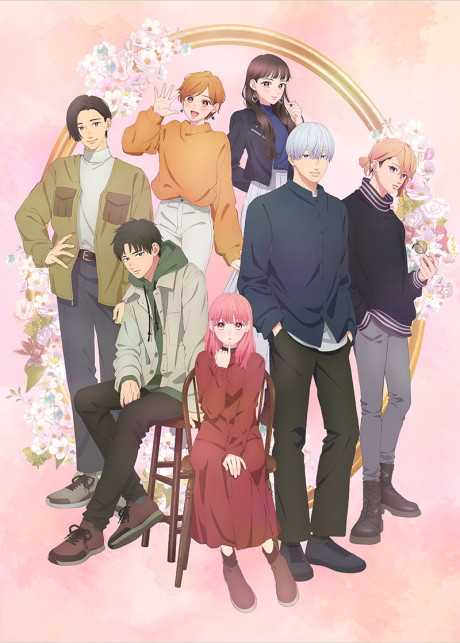About the Anime
A Sign of Affection (2024)
Based on: A Sign of Affection by Suu Morishita | manga
Season(s): 1+
Status: n/a
Demographic: Shōjo
Genre(s): Drama, Romance, Slice of Life
Theme(s): acceptance; communication; friendship; living with disabilities; love
Trigger(s): ableism

Review
⭐⭐⭐ | 3 out of 5 stars
A Sign of Affection is a cute romance series that features adult characters in realistic settings. The story follows Yuki Itose, a university student with hearing impairment, as she navigates her love life after attracting the attention of Itsuomi Nagi. Their attraction to each other is spontaneous as the interest stems from good looks and their different perceptions of the world due to their distinct lives. Itsuomi is curious about Yuki’s hearing impairment and wonders what it’s like living without being able to hear and without being able to clearly communicate with other people. These challenges are explored through Yuki, who wishes to leave her comfort zone.
While the romantic side of the series is nice and all, my interest lies on Yuki’s development and her lifestyle. Not many people in her life know how to use sign language to communicate with her. And although Yuki is used to living this way, the anime suggests that if people took the time to make disabled people’s lives easier, then perhaps their perception of the world may change. Yuki’s life has mostly been in a bubble, though she acknowledges that the world is expansive. Her perspective clashes with Itsuomi, who has seen much of the world in his travels to different countries, but is unable to gauge how Yuki has lived with her perceived limitations.
But the great thing about Yuki’s story is that her disabilities don’t really limit her. In the first season of the anime, she realizes that there’s more that she can do.
So, you might be wondering why I would rate this anime 3 out of 5 stars. While I have plenty of positive things to say about the series, there are also a couple of questionable things that made me take a step back in disbelief.
The Bad
A questionable relationship we’re supposed to root for with an even more questionable guy
Itsuomi’s interest in Yuki is wholesome on the surface. Although she’s incredibly shy and a tad awkward, Yuki sparks an interest in him. With that being said, his interest is quickly narrowed down to an ideation of her. Because she’s deaf, Itsuomi thinks of her as pure and innocent. He wants to be let in to “her world” to better understand her situation—if it can be called a situation. Other than a possible physical attraction to the main character and his interest in her disability, there really isn’t anything more that could be added to the foundation of their relationship. Itsuomi isn’t necessarily ableist, but he was one step too close to fetishizing her for being deaf.
In addition to the main pair’s questionable romantic ties, Itsuomi just doesn’t sell as a well-developed character. I haven’t read the manga (yet), so my impression of Itsuomi is just based on what was presented in the anime. With that being said, he’s not a good character. He’s a traveler and has many friends from different parts of the world, but he’s easy to misunderstand. His intentions with Yuki are made clear, though the quick development of their relationship makes me wary of him. He’s an empty pretty shell. By the end of the first season, I knew who Yuki was and what her aspirations were. Itsuomi, however, is quite literally a nobody who likes to travel. I can make assumptions about his character, but there’s only that to go by. I hope there’s a second season so that viewers will finally learn who Itsuomi is.
Aside from that, Itsuomi is also shown to take advantage of Yuki’s hearing impairment. In episode 4 of the series, he blocks Yuki’s vision to prevent her from reading his lips and the lips of her childhood friend, Ōshi Ashioki, when they were speaking. If that wasn’t a red flag, then I don’t know what is!
The Good
A look at ableism
Ōshi Ashioki is one character who shows his ableist views against Yuki. He’s overprotective and often assumes that she’s unable to do things on her own. While ableism itself is not a good thing, it is acknowledged in the show. Ableism is often shown in a subtle way through Ōshi, who doesn’t realize his own biases. He may see his overprotectiveness of Yuki as justified, but the truth is that he infantilizes her and underestimates her abilities. Although she clearly draws boundaries with this character, Yuki’s need be liberated from people’s perceptions of her disability is undermined by Ōshi.
Ōshi’s character is an interesting one as he shows the potential to develop. He seems to think that he has good intentions, but he also finds it hard to realize that his approach is toxic and unwelcoming. I hope that there’ll be a second season for this anime to see if he does come to accept Yuki for who she is instead of defining her by her disability.
As an able-bodied person, I can’t say for sure that the series does a great job on exploring ableism. However, I do think that the creator did a good job acknowledging it. If you’ve seen the anime and have experience with ableism, feel free to share your opinion on the topic!
Plenty o’ drama and romance
Yes, I did say that I’m not too fond of the main pair’s relationship, but the budding romance and drama of the side characters are just too good to ignore. Rin Fujishiro, Yuki’s friend, starts dating Itsuomi’s cousin, Kyōya Nagi. Their relationship is a slow-burn as Kyōya is confident enough to pursue him, but still too hesitant to ask him out. Their budding relationship is interesting as Rin’s feelings for her are still obscure by the end of the first season. However, he does seem to show an interest in her.
Ema Nakazono and Shin Iryū, who are friends with Itsuomi, have some things to clear up themselves. Shin is completely infatuated with Ema, but Ema is in love with Itsuomi. Although Itsuomi makes it clear that he’s not interested in her, she still pursues him. Shin understands her feelings and backs off, but he finds some courage to confess by the end of Season 1.
Social lives
Itsuomi is touchy and overly affectionate with other people. He’s also a passive character as he lets Ema sleep at his apartment until he began his relationship with Yuki. Itsuomi’s passive nature can come off as ignorant because of how others may see him. His friendly demeanor can be confused with romantic affection. He’s either distant or not.
As for Yuki, her social life is complicated. She’s socially awkward and her hearing impairment doesn’t make things easier for her. Communication can be tricky for her, but she tries to adapt to any situation by texting on her phone or writing on a notebook to interact. Her lifestyle is a good reflection of how difficult life can be for various disabilities. It’s also an interesting look at how society—specifically Japanese society—responds and interacts with people who have disabilities.
Consent and boundaries are key
An interesting thing about Itsuomi and how he interacts with others is his touchy mannerisms that Yuki noticed early on. It almost appears as though he has no awareness of people’s personal boundaries as he’s quick to touch another person or wrap his arm around them. Itsuomi’s intentions are out of friendliness, though Yuki had some discomfort of it. She eventually conveys her discomfort to Itsuomi and sets up boundaries with him, which he seems to respect.
The characters
Most of the characters of the series are charming and easy to like. I know that I completely threw Itsuomi’s character under the bus, but I do think that there’s a lot of potential for his character. Again, I haven’t read the manga, so my assumptions about him are based on the anime’s portrayal of his character.
Other things worth mentioning:
- I will say that it took a while to be convinced of the characters’ ages. Yuki is around 19 or 20 years old, while the other characters are around her age. Sometimes their interactions seem juvenile. They remind me of characters you might find in other shōjo stories that are set in middle and high school.
- The series includes typical romantic tropes, such as friends-to-lovers, the shy female lead, and the complicated love triangle, just to name a few.
- The art style of the show is really pretty. Ajia-do Animation Works (the studio) chose a soft color palette that compliments the tone of the story.
Conclusion
I really hope that this anime gets another season. Good shōjo anime are hard to come by these days as it seems to be the least popular demographic to cater to. Sometimes anime watchers just want to watch simple love stories. A Sign of Affection scratches that itch for wholesome romance.







ur thoughts on itsuomi are so interesting because the fanbase usually writes him off as a green flag without considering what he did in ep 4 and that he likes yuki for being innocent **because of her deafness**
LikeLike